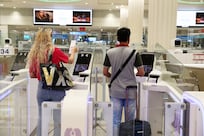MUMBAI/KOLKATA // The maker of the iconic Ambassador has halted production of the car that was long the choice of Indian officials, citing weak demand and a lack of funds.
The decision casts doubt on the future of a vehicle that has looked essentially the same for more than five decades.
Hindustan Motors said in a statement that it had suspended work at its Uttarpara plant, outside the western city of Kolkata, until further notice.
Modelled after the British Morris Oxford, the Ambassador was the first car to be made in India and was once a status symbol.
It began losing its dominance in the mid-1980s when Maruti Suzuki introduced its low-priced 800 hatchback.
It lost further prestige and market share when global automakers began setting up shop in India in the mid-1990s, offering models with contemporary designs and technology.
The Ambassador has remained the choice of a dwindling number of bureaucrats and politicians, and is usually in white with a red beacon on top and a chauffeur at the wheel.
It is also still in use as a taxi in some Indian cities.
In a statement, Hindustan Motors cited “worsening conditions at its Uttarpara plant which include very low productivity, growing indiscipline, critical shortage of funds, lack of demand for its core product the Ambassador and large accumulation of liabilities”.
The company sold about 2,200 Ambassadors in the fiscal year that ended in March 2014, a fraction of the 1.8 million passenger cars sold in India during the year, according to industry data.
A new Ambassador in Kolkata starts at 515,000 rupees (Dh 32,400), according to one dealer.
“The suspension of work will enable the company in restricting mounting liabilities and restructure its organisation and finances and bring in a situation conducive to reopening of the plant,” the company said.
Some industry watchers said it would be difficult for the “grand old lady” of the Indian car market to make a comeback.
“In the present shape I don’t think the Ambassador has got any chances of revival,” said Deepesh Rathore at research firm Emerging Markets Automotive Advisors.
“It doesn’t make any business sense,” he said.
Abdul Majeed, a partner at PriceWaterhouseCoopers India, said that to revive demand, Hindustan Motors would need to invest in shrinking the Ambassador and making it more fuel efficient, with success hardly assured.
Despite its dwindling sales, the distinctive car with its bulbous design and roomy interior has many admirers and was last year named the world’s best taxi by the BBC’s popular Top Gear television show.
In Kolkata, there were some 33,000 Ambassador taxis at the end of 2013.
“There are newer cabs in Kolkata of different companies now, but we still drive an Ambassador and cannot think of the city without it,” said Ashok Kumar Singh, 32, who has driven a yellow Ambassador taxi in Kolkata for a decade.
“She is my livelihood,” he said.
Struggling with falling sales, Hindustan Motors accumulated losses exceeding its net worth at the end of its financial year ended September 30, 2013, and the company has been looking for investors.
* Reuters





